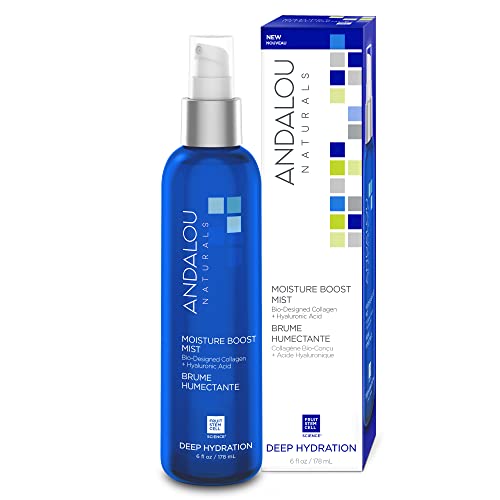
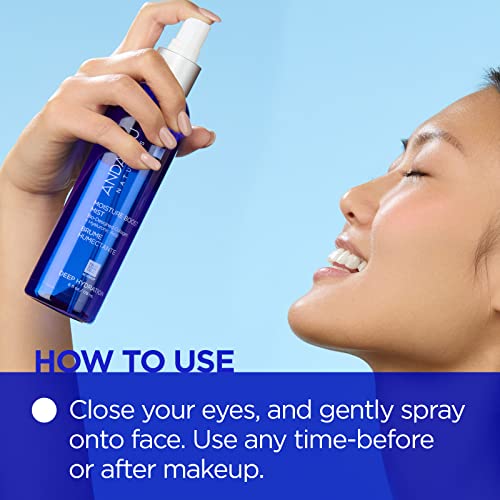
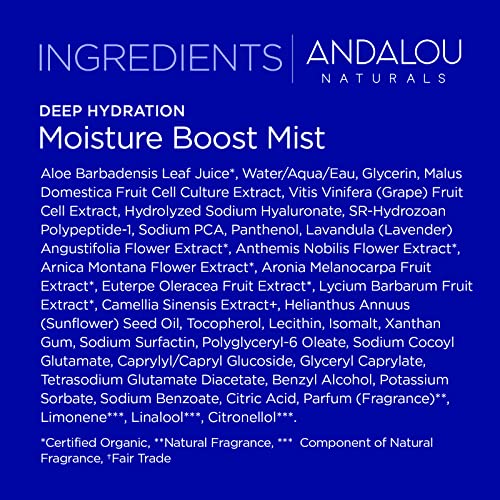
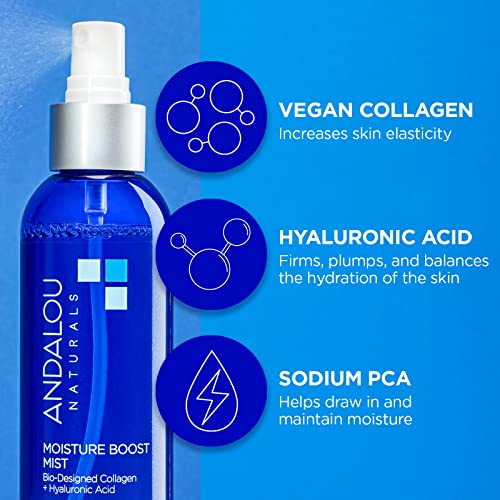
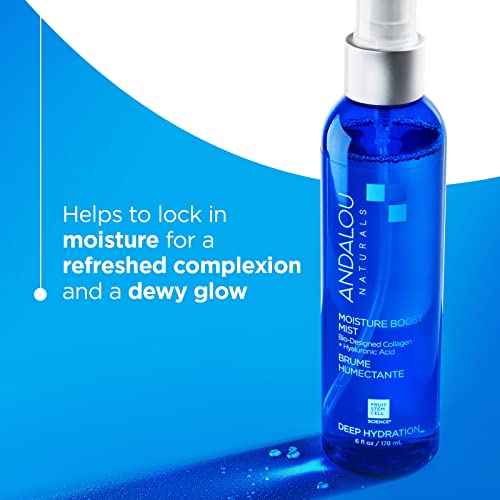
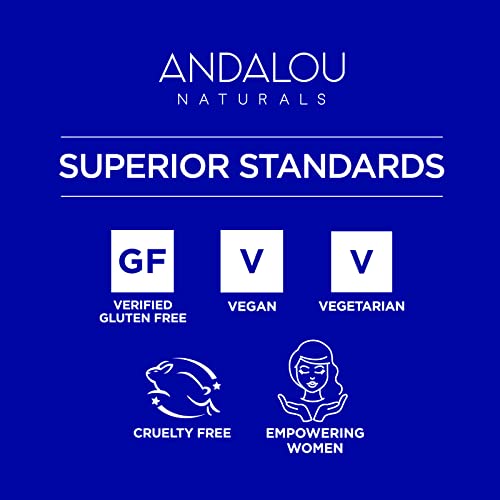
Andalou Naturals Face Mist - Hydrating Spray with Hyaluronic Acid & Bio-Designed Collagen - 6 fl oz


Helianthus Annuus (Sunflower)
Medium RiskHelianthus annuus, commonly known as sunflower, is a plant often used in cosmetic and food products for its oil, which serves as an emollient and moisturizer. It is valued for its lightweight texture and skin-conditioning properties, making it a popular choice in formulations.
Sustai Insights
Sunflower oil provides effective moisturizing benefits and is often sustainably sourced, supporting eco-friendly practices. However, it has a moderate risk of allergenic potential, with some individuals experiencing reactions. Environmental concerns include its role in agricultural practices, which may involve pesticide use. Regulatory assessments indicate low risk for carcinogenicity and reproductive toxicity, with minimal usage restrictions. Overall, while sunflower oil is generally safe, consumers should be mindful of allergies and consider alternatives like jojoba oil for sensitive skin types. The overall assessment of this ingredient is medium risk.
Camellia Sinensis (Green Tea) Extract
Medium RiskCamellia sinensis (green tea) extract is derived from the leaves of the Camellia sinensis plant, commonly used in cosmetics and personal care products for its antioxidant properties. It serves as a skin conditioning agent and can provide a soothing effect due to its natural compounds.
Sustai Insights
Green tea extract offers functional benefits such as antioxidant properties that may protect skin from oxidative stress. However, it poses moderate allergenic potential and should be used cautiously by sensitive individuals. Environmentally, it is considered low risk, with no significant bioaccumulation or pollution concerns. Regulatory bodies have not imposed severe restrictions, but users should maintain safe application practices. Overall, the ingredient presents a medium risk profile due to its potential health and environmental impacts.
Arnica Montana (Arnica) Flower Extract
Medium RiskArnica montana flower extract is derived from the dried flowers of the arnica plant, commonly used in topical formulations for its anti-inflammatory and analgesic properties. It is often included in products aimed at alleviating pain and bruising.
Sustai Insights
Arnica montana flower extract offers functional benefits as a natural anti-inflammatory and pain relief agent, with sustainable sourcing possibilities. However, it poses moderate allergenic risks and can cause skin irritation in sensitive individuals. Regulatory bodies, including the FDA, do not currently restrict its use, indicating a low overall risk for carcinogenicity and reproductive toxicity. Safe usage practices should be followed to minimize adverse effects, and alternatives such as calendula extract may be considered for similar benefits. Overall, the risk level associated with arnica montana extract is assessed as medium.
Hydrolyzed Sodium Hyaluronate
Low RiskHydrolyzed sodium hyaluronate is a salt form of hyaluronic acid, known for its ability to retain moisture. It is commonly used in cosmetic and skincare products as a humectant, helping to hydrate the skin by attracting and holding water molecules.
Sustai Insights
Hydrolyzed sodium hyaluronate provides significant functional benefits, including effective hydration and improved skin texture. It is not associated with major health risks, exhibiting low levels for carcinogenicity, allergies, and reproductive toxicity. Environmentally, it poses minimal risks and is not classified as a pollutant. Regulatory bodies do not impose any significant restrictions on its use. Overall, it is assessed as a low-risk ingredient, suitable for inclusion in various formulations.
Sodium Pca
Low RiskSodium PCA is a derivative of naturally occurring amino acids and is primarily used in cosmetics for its moisturizing properties. It acts as a humectant, attracting and retaining moisture in the skin, thereby enhancing hydration and improving skin texture.
Sustai Insights
Sodium PCA offers functional benefits as an effective humectant, enhancing skin moisture levels. It is derived from natural sources, supporting sustainable practices. Health risks are low, with minimal concerns regarding carcinogenicity, allergies, or reproductive toxicity. Environmental risks are also low, as it is not known to be bioaccumulative or a significant pollutant. Regulatory bodies have not placed significant restrictions on its use. Overall, it presents a low risk profile, making it a suitable ingredient in cosmetic formulations. Alternatives may include other humectants like glycerin or hyaluronic acid.
Malus Domestica Fruit Cell Culture Extract
Low RiskMalus domestica fruit cell culture extract, derived from apple fruit cell cultures, is primarily used in cosmetic formulations for its hydrating and antioxidant properties. It is incorporated to enhance skin health and improve the stability of products through its natural compounds.
Sustai Insights
Malus domestica fruit cell culture extract offers functional benefits such as hydration and antioxidant support, contributing positively to skin care. It is considered low risk regarding health concerns, including carcinogenicity and allergenic potential, with minimal environmental impact. Regulatory assessments indicate no significant restrictions. Safe usage practices should be followed, with alternatives like other botanical extracts available for similar benefits. Overall, the ingredient is assessed to have a low risk.
Euterpe Oleracea (Acai) Fruit Extract
Low RiskEuterpe oleracea (acai) fruit extract is derived from the acai palm's fruit, primarily used in cosmetic formulations for its antioxidant properties and skin conditioning benefits. It is noted for its rich content of polyphenols and vitamins, contributing to overall product efficacy.
Sustai Insights
Euterpe oleracea extract provides functional benefits, including antioxidant properties that can enhance skin health and support hydration. It is sustainably sourced, contributing to environmentally friendly practices. Health risks are minimal, with low concerns for carcinogenicity, allergies, and reproductive toxicity. Environmental risks are also low, with no significant pollutants or bioaccumulation noted. Regulatory status is favorable, with no major restrictions. Overall, the ingredient is assessed as low risk, with safe usage practices advised for sensitive populations.
Water
Low RiskWater is a clear, colorless liquid essential for various biological processes. It serves as a solvent in formulations, facilitating the dissolution of other ingredients and enhancing product texture and application. Additionally, water plays a crucial role in hydration and is a key component in many cosmetic and personal care products.
Sustai Insights
Water is an effective solvent and hydrator, contributing to the texture and efficacy of formulations. It is biodegradable and generally regarded as safe, with low concerns regarding carcinogenicity, allergies, and reproductive toxicity. However, excessive water usage can lead to environmental concerns, particularly regarding resource depletion. Regulatory bodies do not impose restrictions on water use in cosmetics. Overall, the risks associated with water are low, making it a safe and essential ingredient.
Lycium Barbarum (Matrimony Vine) Fruit Extract
Low RiskLycium barbarum (matrimony vine) fruit extract is derived from the fruit of the Lycium barbarum plant, traditionally used in herbal medicine. It is commonly incorporated in cosmetic and personal care products for its potential antioxidant properties and as a natural ingredient aimed at enhancing skin appearance and health.
Sustai Insights
Lycium barbarum fruit extract offers functional benefits such as antioxidant activity and possible skin conditioning effects. It is considered sustainably sourced, with low health risks, including negligible concerns for carcinogenicity, allergies, and reproductive toxicity. Environmental impact is minimal, with no significant pollutant or bioaccumulation concerns. Regulatory assessments indicate no current restrictions. Overall, the risk level is low, and safe usage practices should be followed. Alternatives may include other botanical extracts with similar properties.
Sr Hydrozoan Polypeptide 1
Low RiskSR-Hydrozoan Polypeptide-1 is a single chain recombinant polypeptide derived from hydrozoan organisms. It is primarily used in cosmetic formulations for its potential hydrating and skin-conditioning properties.
Sustai Insights
SR-Hydrozoan Polypeptide-1 offers functional benefits as a skin-conditioning agent, contributing to hydration. It is not associated with significant health risks, with low concerns regarding carcinogenicity, allergies, and reproductive toxicity. Environmentally, it poses low risks without bioaccumulation or pollution potential. The ingredient is not currently restricted by regulatory agencies, indicating a low-risk profile overall. Safe usage practices should be followed, and alternatives may include other skin-conditioning agents that do not compromise efficacy.
Panthenol, D
Low RiskPanthenol, also known as provitamin B5, is a humectant commonly used in cosmetic and personal care products. It functions primarily as a moisturizer, enhancing skin hydration and improving the appearance of hair by imparting shine and softness.
Sustai Insights
Panthenol is effective in retaining moisture, thus providing functional benefits for skin and hair care products. It is generally recognized as safe, with low concerns regarding carcinogenicity, allergies, and developmental toxicity. However, potential cumulative exposure from multiple sources exists. Environmental risks are minimal, and it is not bioaccumulative. Regulatory bodies have not issued significant warnings; therefore, the overall risk level is assessed as low. For optimal use, it is recommended to follow product guidelines, and alternatives such as glycerin may also be considered for moisturizing effects.
Vitis Vinifera (Grape) Fruit Cell Extract
Low RiskVitis vinifera (grape) fruit cell extract is derived from grape cells and is commonly used in cosmetic formulations for its moisturizing and antioxidant properties. It is known for its potential to promote skin health and is often included in products aimed at improving skin texture and appearance.
Sustai Insights
This ingredient offers several functional benefits, including hydration and antioxidant protection, which can enhance skin health. It is generally considered safe with a low risk of health concerns, including carcinogenicity and allergies. There are no significant environmental hazards associated with its use, and it is not subject to regulatory restrictions. However, users should practice safe application methods. Alternatives may include other plant extracts known for similar benefits, but overall, the ingredient's risk level is categorized as low.
Vegetarian Glycerin
Low RiskVegetarian glycerin, also known as glycerol, is a colorless, odorless, and viscous liquid derived from plant sources. It is primarily used as a humectant, solvent, and emollient in various personal care products, helping to retain moisture and improve texture.
Sustai Insights
Vegetarian glycerin offers functional benefits as an effective humectant, promoting hydration and skin smoothness. It is biodegradable and typically sustainably sourced. Health risks associated with glycerin are low, with no significant concerns for carcinogenicity, allergens, or reproductive toxicity. Environmental risks are minimal, and it is not subject to major regulatory warnings. Overall, the risk level for this ingredient is low, making it a safe choice in formulations. Safe usage practices include ensuring proper concentrations in products, and alternatives such as propylene glycol exist but may have differing properties.
Hydrolyzed Sodium Hyaluronate
Low RiskHydrolyzed sodium hyaluronate is a salt form of hyaluronic acid, known for its ability to retain moisture. It is commonly used in cosmetic and skincare products as a humectant, helping to hydrate the skin by attracting and holding water molecules.
Sustai Insights
Hydrolyzed sodium hyaluronate provides significant functional benefits, including effective hydration and improved skin texture. It is not associated with major health risks, exhibiting low levels for carcinogenicity, allergies, and reproductive toxicity. Environmentally, it poses minimal risks and is not classified as a pollutant. Regulatory bodies do not impose any significant restrictions on its use. Overall, it is assessed as a low-risk ingredient, suitable for inclusion in various formulations.
Helianthus Annuus (Sunflower)
Medium RiskHelianthus annuus, commonly known as sunflower, is a plant often used in cosmetic and food products for its oil, which serves as an emollient and moisturizer. It is valued for its lightweight texture and skin-conditioning properties, making it a popular choice in formulations.
Sustai Insights
Sunflower oil provides effective moisturizing benefits and is often sustainably sourced, supporting eco-friendly practices. However, it has a moderate risk of allergenic potential, with some individuals experiencing reactions. Environmental concerns include its role in agricultural practices, which may involve pesticide use. Regulatory assessments indicate low risk for carcinogenicity and reproductive toxicity, with minimal usage restrictions. Overall, while sunflower oil is generally safe, consumers should be mindful of allergies and consider alternatives like jojoba oil for sensitive skin types. The overall assessment of this ingredient is medium risk.
Sodium Pca
Low RiskSodium PCA is a derivative of naturally occurring amino acids and is primarily used in cosmetics for its moisturizing properties. It acts as a humectant, attracting and retaining moisture in the skin, thereby enhancing hydration and improving skin texture.
Sustai Insights
Sodium PCA offers functional benefits as an effective humectant, enhancing skin moisture levels. It is derived from natural sources, supporting sustainable practices. Health risks are low, with minimal concerns regarding carcinogenicity, allergies, or reproductive toxicity. Environmental risks are also low, as it is not known to be bioaccumulative or a significant pollutant. Regulatory bodies have not placed significant restrictions on its use. Overall, it presents a low risk profile, making it a suitable ingredient in cosmetic formulations. Alternatives may include other humectants like glycerin or hyaluronic acid.
Malus Domestica Fruit Cell Culture Extract
Low RiskMalus domestica fruit cell culture extract, derived from apple fruit cell cultures, is primarily used in cosmetic formulations for its hydrating and antioxidant properties. It is incorporated to enhance skin health and improve the stability of products through its natural compounds.
Sustai Insights
Malus domestica fruit cell culture extract offers functional benefits such as hydration and antioxidant support, contributing positively to skin care. It is considered low risk regarding health concerns, including carcinogenicity and allergenic potential, with minimal environmental impact. Regulatory assessments indicate no significant restrictions. Safe usage practices should be followed, with alternatives like other botanical extracts available for similar benefits. Overall, the ingredient is assessed to have a low risk.
Euterpe Oleracea (Acai) Fruit Extract
Low RiskEuterpe oleracea (acai) fruit extract is derived from the acai palm's fruit, primarily used in cosmetic formulations for its antioxidant properties and skin conditioning benefits. It is noted for its rich content of polyphenols and vitamins, contributing to overall product efficacy.
Sustai Insights
Euterpe oleracea extract provides functional benefits, including antioxidant properties that can enhance skin health and support hydration. It is sustainably sourced, contributing to environmentally friendly practices. Health risks are minimal, with low concerns for carcinogenicity, allergies, and reproductive toxicity. Environmental risks are also low, with no significant pollutants or bioaccumulation noted. Regulatory status is favorable, with no major restrictions. Overall, the ingredient is assessed as low risk, with safe usage practices advised for sensitive populations.
Water
Low RiskWater is a clear, colorless liquid essential for various biological processes. It serves as a solvent in formulations, facilitating the dissolution of other ingredients and enhancing product texture and application. Additionally, water plays a crucial role in hydration and is a key component in many cosmetic and personal care products.
Sustai Insights
Water is an effective solvent and hydrator, contributing to the texture and efficacy of formulations. It is biodegradable and generally regarded as safe, with low concerns regarding carcinogenicity, allergies, and reproductive toxicity. However, excessive water usage can lead to environmental concerns, particularly regarding resource depletion. Regulatory bodies do not impose restrictions on water use in cosmetics. Overall, the risks associated with water are low, making it a safe and essential ingredient.
Lycium Barbarum (Matrimony Vine) Fruit Extract
Low RiskLycium barbarum (matrimony vine) fruit extract is derived from the fruit of the Lycium barbarum plant, traditionally used in herbal medicine. It is commonly incorporated in cosmetic and personal care products for its potential antioxidant properties and as a natural ingredient aimed at enhancing skin appearance and health.
Sustai Insights
Lycium barbarum fruit extract offers functional benefits such as antioxidant activity and possible skin conditioning effects. It is considered sustainably sourced, with low health risks, including negligible concerns for carcinogenicity, allergies, and reproductive toxicity. Environmental impact is minimal, with no significant pollutant or bioaccumulation concerns. Regulatory assessments indicate no current restrictions. Overall, the risk level is low, and safe usage practices should be followed. Alternatives may include other botanical extracts with similar properties.
Sr Hydrozoan Polypeptide 1
Low RiskSR-Hydrozoan Polypeptide-1 is a single chain recombinant polypeptide derived from hydrozoan organisms. It is primarily used in cosmetic formulations for its potential hydrating and skin-conditioning properties.
Sustai Insights
SR-Hydrozoan Polypeptide-1 offers functional benefits as a skin-conditioning agent, contributing to hydration. It is not associated with significant health risks, with low concerns regarding carcinogenicity, allergies, and reproductive toxicity. Environmentally, it poses low risks without bioaccumulation or pollution potential. The ingredient is not currently restricted by regulatory agencies, indicating a low-risk profile overall. Safe usage practices should be followed, and alternatives may include other skin-conditioning agents that do not compromise efficacy.
Camellia Sinensis (Green Tea) Extract
Medium RiskCamellia sinensis (green tea) extract is derived from the leaves of the Camellia sinensis plant, commonly used in cosmetics and personal care products for its antioxidant properties. It serves as a skin conditioning agent and can provide a soothing effect due to its natural compounds.
Sustai Insights
Green tea extract offers functional benefits such as antioxidant properties that may protect skin from oxidative stress. However, it poses moderate allergenic potential and should be used cautiously by sensitive individuals. Environmentally, it is considered low risk, with no significant bioaccumulation or pollution concerns. Regulatory bodies have not imposed severe restrictions, but users should maintain safe application practices. Overall, the ingredient presents a medium risk profile due to its potential health and environmental impacts.
Panthenol, D
Low RiskPanthenol, also known as provitamin B5, is a humectant commonly used in cosmetic and personal care products. It functions primarily as a moisturizer, enhancing skin hydration and improving the appearance of hair by imparting shine and softness.
Sustai Insights
Panthenol is effective in retaining moisture, thus providing functional benefits for skin and hair care products. It is generally recognized as safe, with low concerns regarding carcinogenicity, allergies, and developmental toxicity. However, potential cumulative exposure from multiple sources exists. Environmental risks are minimal, and it is not bioaccumulative. Regulatory bodies have not issued significant warnings; therefore, the overall risk level is assessed as low. For optimal use, it is recommended to follow product guidelines, and alternatives such as glycerin may also be considered for moisturizing effects.
Vitis Vinifera (Grape) Fruit Cell Extract
Low RiskVitis vinifera (grape) fruit cell extract is derived from grape cells and is commonly used in cosmetic formulations for its moisturizing and antioxidant properties. It is known for its potential to promote skin health and is often included in products aimed at improving skin texture and appearance.
Sustai Insights
This ingredient offers several functional benefits, including hydration and antioxidant protection, which can enhance skin health. It is generally considered safe with a low risk of health concerns, including carcinogenicity and allergies. There are no significant environmental hazards associated with its use, and it is not subject to regulatory restrictions. However, users should practice safe application methods. Alternatives may include other plant extracts known for similar benefits, but overall, the ingredient's risk level is categorized as low.
Vegetarian Glycerin
Low RiskVegetarian glycerin, also known as glycerol, is a colorless, odorless, and viscous liquid derived from plant sources. It is primarily used as a humectant, solvent, and emollient in various personal care products, helping to retain moisture and improve texture.
Sustai Insights
Vegetarian glycerin offers functional benefits as an effective humectant, promoting hydration and skin smoothness. It is biodegradable and typically sustainably sourced. Health risks associated with glycerin are low, with no significant concerns for carcinogenicity, allergens, or reproductive toxicity. Environmental risks are minimal, and it is not subject to major regulatory warnings. Overall, the risk level for this ingredient is low, making it a safe choice in formulations. Safe usage practices include ensuring proper concentrations in products, and alternatives such as propylene glycol exist but may have differing properties.
Arnica Montana (Arnica) Flower Extract
Medium RiskArnica montana flower extract is derived from the dried flowers of the arnica plant, commonly used in topical formulations for its anti-inflammatory and analgesic properties. It is often included in products aimed at alleviating pain and bruising.
Sustai Insights
Arnica montana flower extract offers functional benefits as a natural anti-inflammatory and pain relief agent, with sustainable sourcing possibilities. However, it poses moderate allergenic risks and can cause skin irritation in sensitive individuals. Regulatory bodies, including the FDA, do not currently restrict its use, indicating a low overall risk for carcinogenicity and reproductive toxicity. Safe usage practices should be followed to minimize adverse effects, and alternatives such as calendula extract may be considered for similar benefits. Overall, the risk level associated with arnica montana extract is assessed as medium.
Revitalize your skincare routine with Andalou Naturals Face Mist, a luxurious moisture boost formulated with Bio-Designed Collagen and Hyaluronic Acid. Ideal for normal, dry, and dehydrated skin, this refreshing facial spray locks in moisture, providing a dewy glow while harnessing nature's powerful ingredients.
- Enhanced Hydration: Bio-Designed Collagen improves skin moisturization by 20 times compared to traditional marine sources, ensuring deep hydration.
- Nature-Powered Ingredients: Contains organic, non-GMO, and vegan components that are cruelty-free and sustainably sourced, reflecting a commitment to the environment.
- Youthful Radiance: Infused with fruit stem cell science, this mist supports antioxidant defense for a revitalized and youthful appearance.
- Versatile Use: Perfect for quick hydration boosts throughout the day, it can also be applied before makeup for a smoother finish.
- Customer-Approved Quality: Trusted by users for its effectiveness and clean ingredient standards, Andalou Naturals prioritizes transparency and sustainability in skincare.
Subscribe & Save with Sustai
- Best Price Guarantee: Always enjoy the lowest prices on sustainable home essentials.
- No Surprises: We’ll notify you before shipping. No hidden fees, ever.
- You’re in Charge: Change, pause, or cancel your subscription anytime with ease.
- Eco-Friendly Deliveries: Our grouped shipments mean less packaging and lower emissions.
Join us on a sustainable journey. Special offers for a limited time! Prices and promotions may change.
Recommended Products
Revitalize your skincare routine with Andalou Naturals Face Mist, a luxurious moisture boost formulated with Bio-Designed Collagen and Hyaluronic Acid. Ideal for normal, dry, and dehydrated skin, this refreshing facial spray locks in moisture, providing a dewy glow while harnessing nature's powerful ingredients.
- Enhanced Hydration: Bio-Designed Collagen improves skin moisturization by 20 times compared to traditional marine sources, ensuring deep hydration.
- Nature-Powered Ingredients: Contains organic, non-GMO, and vegan components that are cruelty-free and sustainably sourced, reflecting a commitment to the environment.
- Youthful Radiance: Infused with fruit stem cell science, this mist supports antioxidant defense for a revitalized and youthful appearance.
- Versatile Use: Perfect for quick hydration boosts throughout the day, it can also be applied before makeup for a smoother finish.
- Customer-Approved Quality: Trusted by users for its effectiveness and clean ingredient standards, Andalou Naturals prioritizes transparency and sustainability in skincare.

You can have at most 2 Sustainable Steals products in your cart
Customer Reviews
Customers’ View
Customers appreciate the refreshing and hydrating qualities of the Andalou Naturals Revitalizing Face Mist, often noting its effectiveness in revitalizing dry skin. Many users highlight how the mist enhances their skincare routine, with one customer mentioning, "my skin drinks it and looks so hydrated and luminous after use." The product's clean, organic ingredients resonate well with health-conscious consumers, who value its eco-friendly and cruelty-free formulation. Some reviews mention the versatility of the mist, as it can be used before makeup or for an instant hydration boost throughout the day. However, a few customers pointed out issues with the spray mechanism and the product's scent, indicating mixed feelings. Overall, consumers find this face mist beneficial for maintaining skin moisture while aligning with their sustainable lifestyle.
AI-generated from the text of customer reviewsThis product has no reviews yet.





